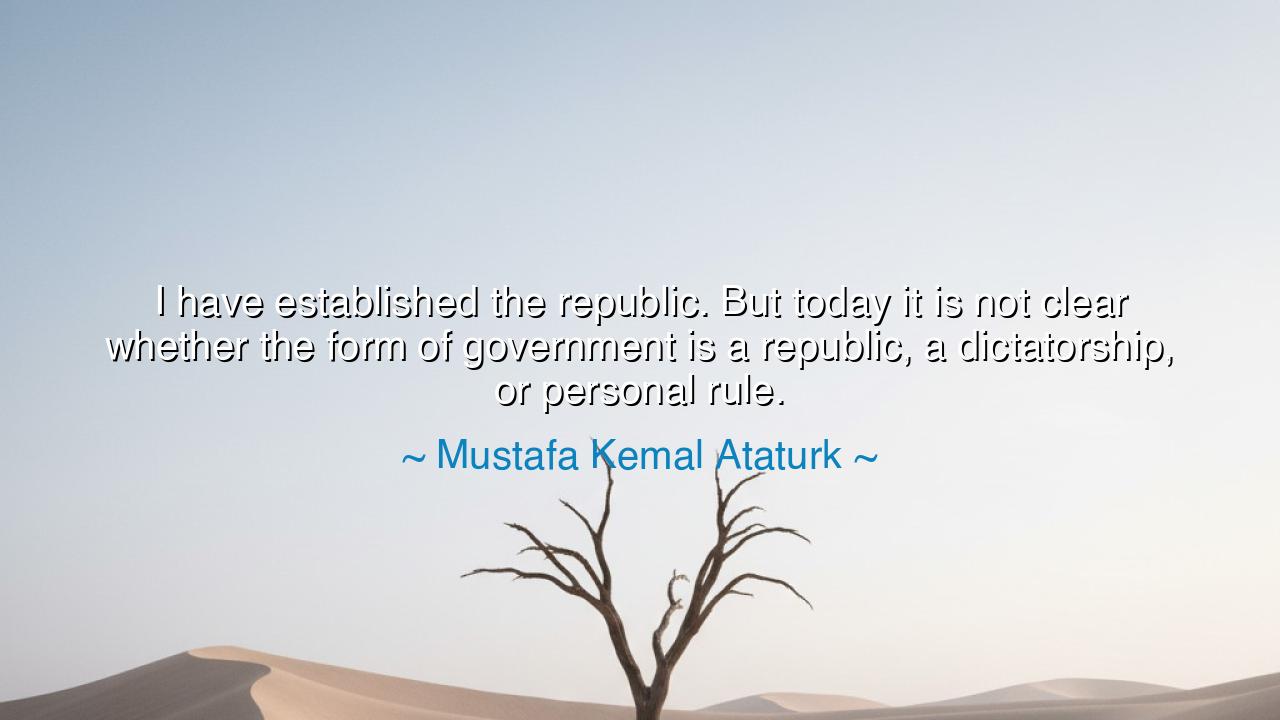
I have established the republic. But today it is not clear
I have established the republic. But today it is not clear whether the form of government is a republic, a dictatorship, or personal rule.






The words of Mustafa Kemal Atatürk, founder of modern Turkey, fall like the confession of a warrior who has conquered the battlefield but stands uncertain before the realm of the spirit: “I have established the republic. But today it is not clear whether the form of government is a republic, a dictatorship, or personal rule.” These words, spoken near the end of his life, echo with the melancholy wisdom of a man who had wrestled an empire from death, forged a new nation from ashes, and yet wondered whether his creation had remained true to his vision. In them lies a timeless truth—that the founding of a republic is not an end, but a beginning, and that even the noblest of revolutions can falter when power gathers too closely around one man’s will.
The origin of this quote is found in the later years of Atatürk’s life, when he reflected upon the state he had built after the collapse of the Ottoman Empire. In 1923, Turkey was reborn from the ruins of war and occupation, guided by Atatürk’s vision of secularism, national unity, and modernization. The sultanate and the caliphate—symbols of centuries-old theocratic power—were abolished. The new republic was to be governed not by divine decree, but by the rule of law, science, and reason. Yet as the years passed, Atatürk, the liberator and reformer, became a figure of immense authority—his word law, his image revered, his will unchallenged. Thus, he saw with sorrow that even in a republic, power can become personal, and that the line between leadership and domination is as thin as the edge of a sword.
In the ancient style, let us reflect upon the heart of this paradox. To found a republic is to plant the seed of freedom in soil long accustomed to command. But freedom, like a fragile shoot, must be tended with humility and restraint—or it will grow twisted, choking itself in the shadow of the very hand that planted it. Atatürk, like the Roman Cincinnatus, rose from the field of battle to build a state for his people. Yet unlike Cincinnatus, who returned to his plow when his work was done, Atatürk could not step away, for his people still clung to him as both father and ruler. Thus, he found himself bound by the very loyalty he had inspired, trapped in the golden cage of hero worship. He had built a nation to be free, yet he saw the danger that his own greatness might enslave it.
History is rich with the same tragedy. When Julius Caesar freed Rome from civil war, the people crowned him dictator for life. They saw in him not a tyrant, but a savior—and thus the republic fell beneath the weight of gratitude. So too did Napoleon Bonaparte, who rose from the chaos of the French Revolution, promising liberty and equality, only to become emperor. Each of these men sought to restore order and dignity to their nations, yet in doing so, they discovered that power, even when born from virtue, hungers for permanence. Atatürk, with the wisdom of self-awareness, recognized this danger in his own rule. His lament was not one of regret, but of warning: that the republic must not become an idol bearing one man’s face.
Yet let us not mistake Atatürk’s words for weakness. They are not the voice of failure, but of moral vigilance. For only the wise acknowledge their own shadow. He understood that a nation’s destiny cannot rest forever upon a single man’s shoulders. The republic, to endure, must belong to the people, not to the founder. His greatness lay not merely in his victories, but in his foresight—the humility to question his own power, and the courage to entrust the future to others. The true test of leadership, as he knew, is not to rule perfectly, but to build institutions strong enough to outlive their maker.
So, my children of the future, learn from this ancient lesson carved in the life of Mustafa Kemal Atatürk: the building of a republic is not a monument, but a living flame. It must be kept alive by reason, by justice, and by the participation of all citizens. When a nation forgets this, it returns to the comfort of chains, calling them security. Beware, then, the leader who claims to embody the state, for where one man becomes the government, the people cease to be free. Even the noblest father of a nation must one day let his children walk alone.
Therefore, cherish the wisdom Atatürk offered in his final reflection. A republic must always guard against becoming a dictatorship, even a benevolent one. The moment the people surrender their judgment to one ruler, they exchange liberty for ease. Strive instead for a nation where every man and woman bears the weight of citizenship, where the voice of the people, not the will of the leader, shapes the law. For only then can a republic remain pure—ever renewing itself, never resting in the shadow of a single name.
Thus, let these words endure as both tribute and caution: Atatürk founded a republic, but he also foresaw the peril that haunts every revolution—the danger that freedom, once won, may again be lost through reverence, fear, or indifference. Let us honor him not by worshiping his image, but by fulfilling his dream—a nation of free minds, courageous hearts, and humble leaders, where the spirit of the republic burns bright, guided not by one man, but by the conscience of all.






AAdministratorAdministrator
Welcome, honored guests. Please leave a comment, we will respond soon